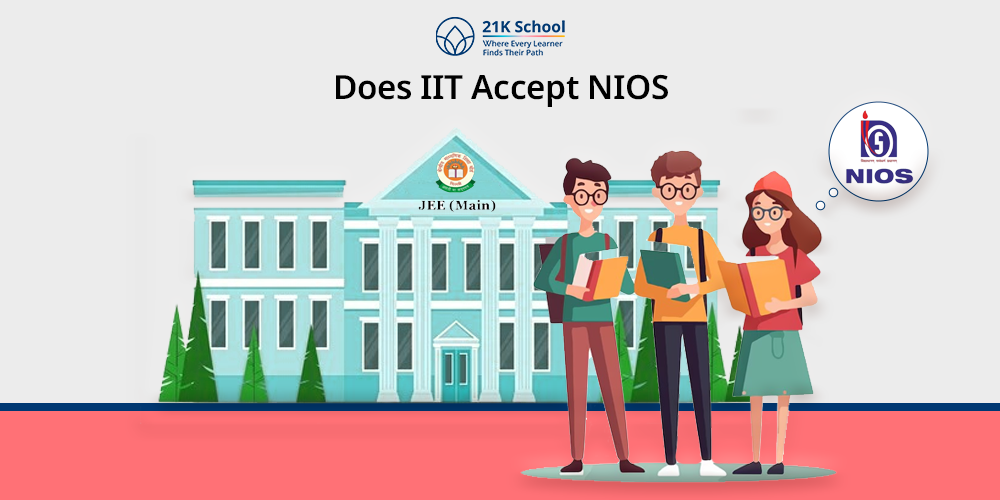
Are you a NIOS student and worried about whether you are eligible for IIT or not?
Yes, IIT accepts NIOS students, for every child does IIT accept NIOS is a common question that arises in students’ minds while appearing for the JEE/JEE Advanced.
However, the answer is yes, IIT accepts NIOS certification; students who have passed through NIOS board are eligible to appear for the IIT.
Many children think that a NIOS degree is not valid and they will not be accepted by IITs, but in reality, it is a government-recognised board that allows students to take admission in any institution.
National Institute of Open Schooling is a government-approved educational board for open schooling, which allows students to study as per their own comfortability.
Students who have passed through NIOS are eligible to apply for India’s any state, central or private institution.
Even students can appear for any Medical, Engineering and other competitive examinations such as IIT-JEE, AIEEE, PMT, NEET and also other professional and academic courses.
Students who have an NIOS certificate can also apply for central or state-level government jobs. However, candidates appearing for the competitive exams need to check the eligibility criteria, such as age limit, qualification, and other related criteria.
Contents
Here is Why NIOS is Recognised for IIT?
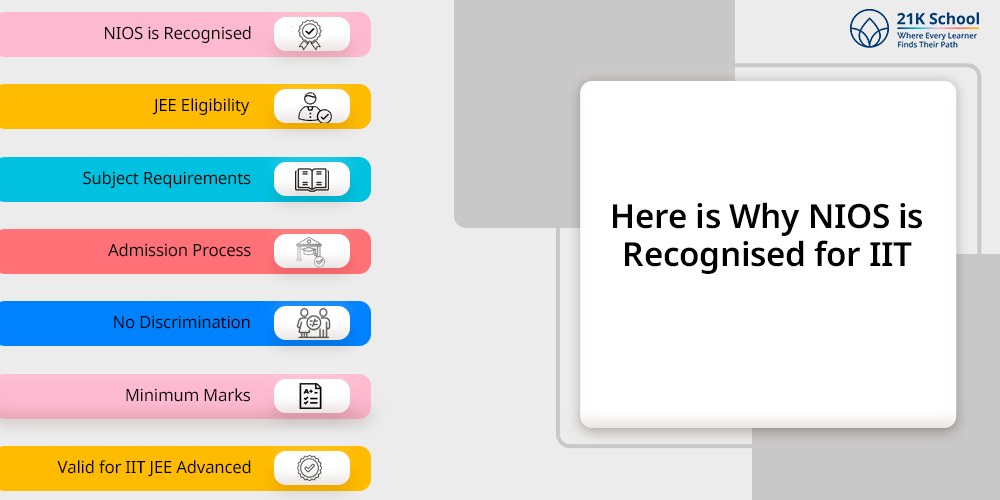
IIT accepts students who have passed through NIOS. NIOS offers flexible and multilevel education that allows students to complete their courses in any program.
Through NIOS, students can enrol in any competitive exams in India, including JEE and NEET. Here is why NIOS is recognised as an IIT.
1. NIOS is Recognised
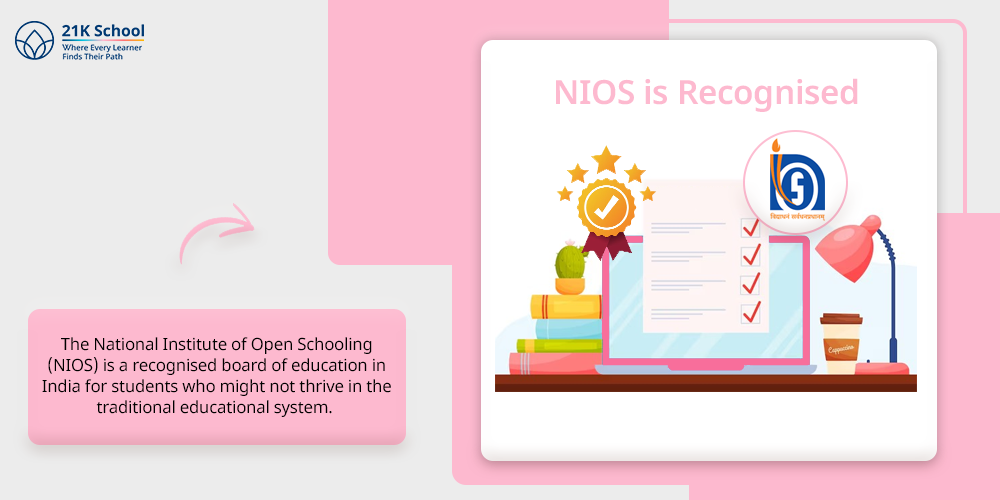
The National Institute of Open Schooling (NIOS) is a recognised board of education in India for students who might not thrive in the traditional educational system.
NIOS qualifications are equivalent to other significant boards such as the Central Board of Secondary Education (CBSE) and the Indian Certificate of Secondary Education (ICSE). NIOS is accepted all over India for higher education or for competitive examinations.
2. JEE Eligibility
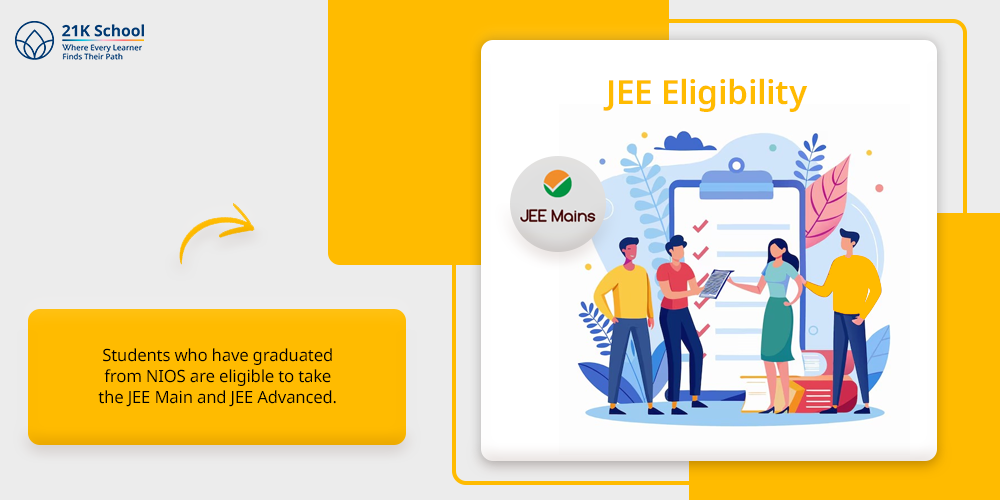
Students who have graduated from NIOS are eligible to take the JEE Main and JEE Advanced. Students need to pass this examination in order to be admitted to esteemed engineering institutes, including the IIT.
As the NIOS board is government-certified, students can pursue their engineering in any stream, and it doesn’t become an educational barrier to pursuing their engineering goals.
3. Subject Requirements
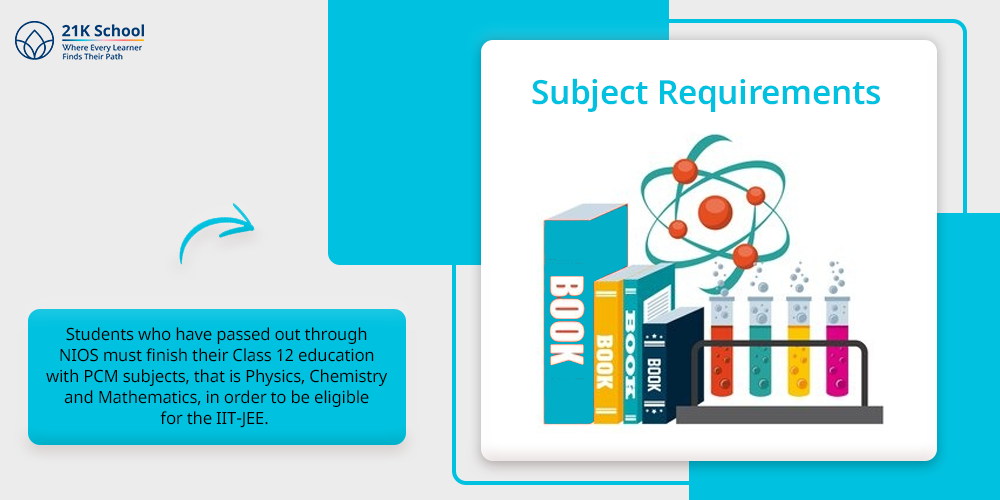
Students who have passed out through NIOS must finish their Class 12 education with PCM subjects, that is Physics, Chemistry and Mathematics, in order to be eligible for the IIT-JEE.
In addition to being required to sit for the JEE exams, these subjects are crucial for laying a solid foundation in engineering. In order to prepare students for the demands of engineering studies, NIOS makes sure that they have a firm grasp of these fundamental subjects.
4. Admission Process
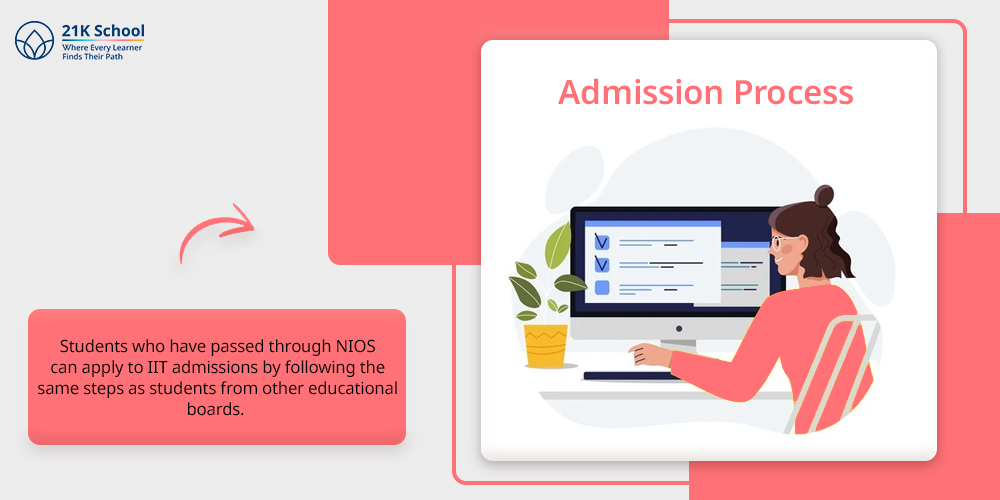
All students can apply to IIT, and there are no special requirements for NIOS students. Students who have passed through NIOS can apply to IIT admissions by following the same steps as students from other educational boards.
NIOS students can be admitted to IITs without the additional documentation that some may require, such as migration certificates.
5. No Discrimination
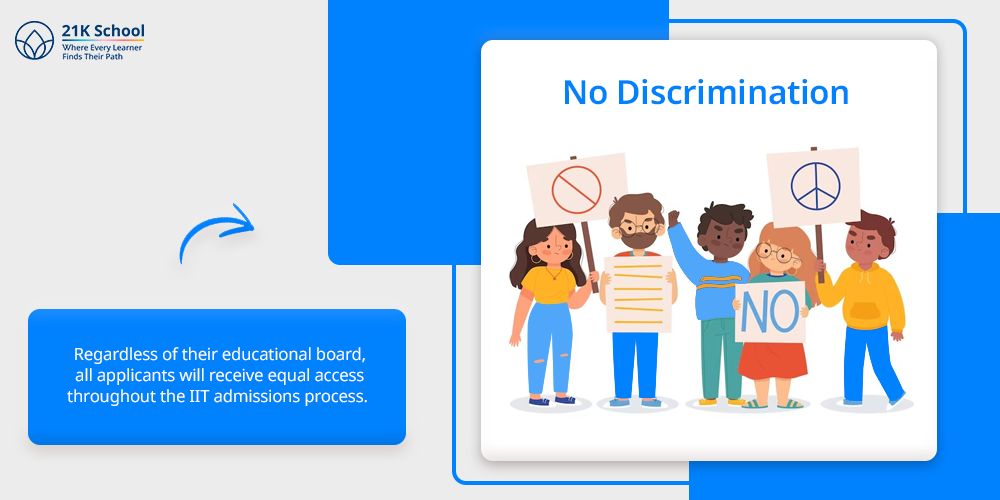
IIT admissions are non-discriminatory, which allows students to achieve equal opportunity. Regardless of their educational board, all applicants will receive equal access throughout the IIT admissions process.
By ensuring that NIOS students have equal opportunities to those from traditional boards, this non-discriminatory approach fosters equity and inclusivity in the selection process.
6. Minimum Marks
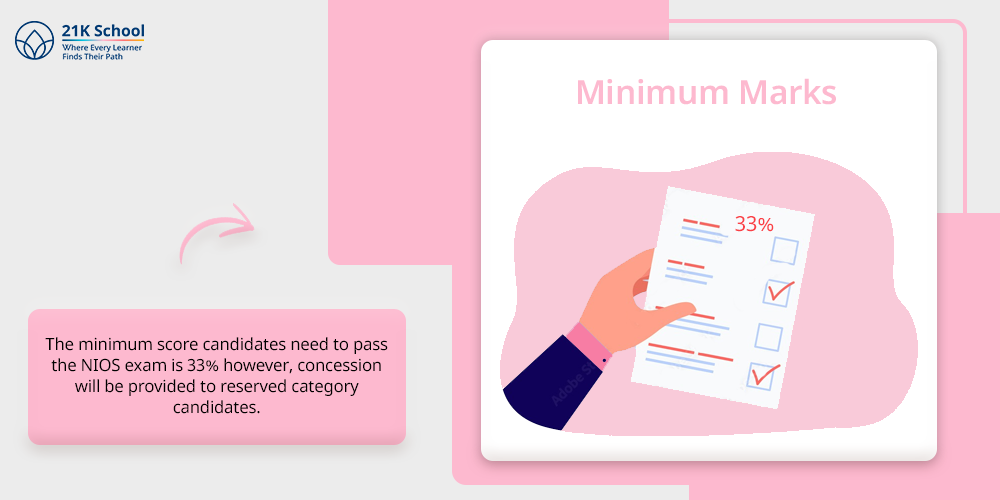
Students who want to appear for the JEE examination must pass their senior secondary exams with a minimum percentage. Academic performance is the primary admissions requirement since it is applied consistently to all students.
The minimum score candidates need to pass the NIOS exam is 33% however, concession will be provided to reserved category candidates. These minimum scores demonstrate NIOS students’ preparedness for the rigours of engineering colleges.
7. Valid for IIT JEE Advanced
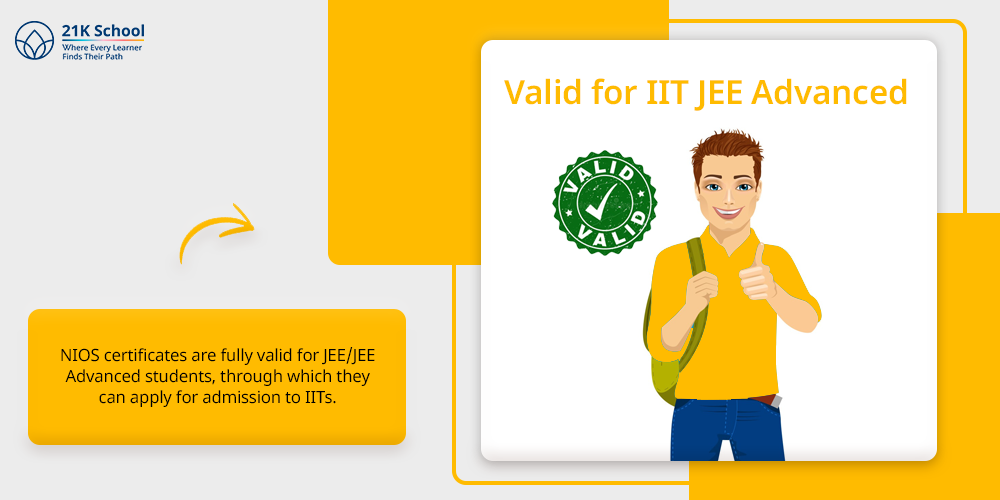
NIOS certificates are fully valid for JEE/JEE Advanced students, through which they can apply for admission to IITs. This recognition makes NIOS trustworthy and creates an educational pathway for students who want to enrol in engineering colleges in India.
By enrolling in JEE/JEE Advanced, NIOS students can pursue their dreams of attending some of the top engineering schools in the country.
What are the Eligibility Criteria for IIT Admission with NIOS?
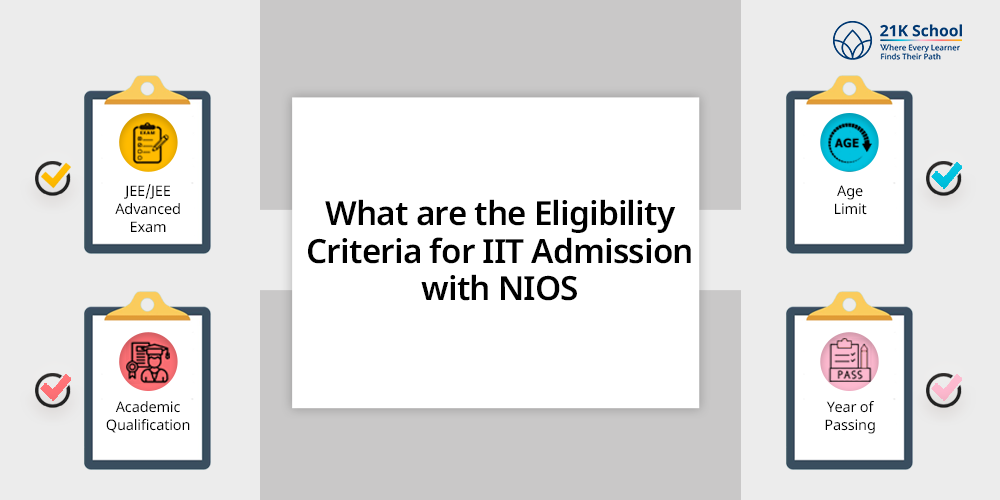
Students who have passed through NIOS are eligible to appear for the IIT-JEE examination without any barriers. NIOS conducts public examinations at secondary and senior secondary levels.
It provides a route of learning to students, which enables students to appear for any competitive examination throughout India.
While appearing for the national level examination, it is essential for students to check the eligibility criteria for the Indian Institute of Technology (IIT). The following are the eligibility criteria for IIT with NIOS.
1. JEE/JEE Advanced Exam
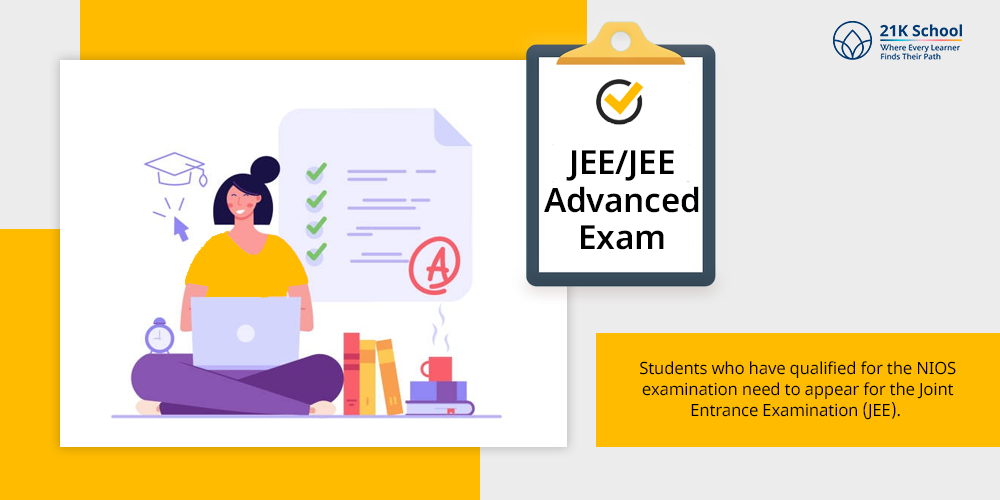
The first step to being enrolled in IIT is to clear the JEE examination. Students who have qualified for the NIOS examination need to appear for the Joint Entrance Examination (JEE). The JEE exam is divided into two sections: JEE Main and JEE Advanced.
The JEE Main exam must be passed before applicants can be admitted to the Indian Institutes of Technology (IITs).
Those who do well enough in JEE Main are eligible to take the IIT JEE Advanced entrance examination. Candidates are only eligible for IIT if they have achieved the cutoff percentile.
2. Age Limit
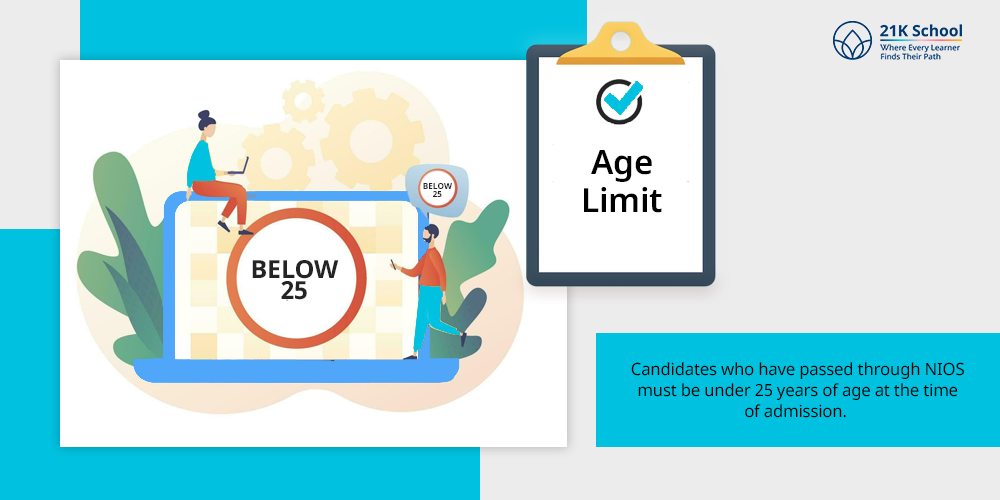
Age limit is the minimum eligibility criteria for candidates to appear for the IIT-JEE examination. Candidates who have passed through NIOS must be under 25 years of age at the time of admission.
However, age relaxation will be provided to candidates who are from reserved categories such as SC/ST, OBC, EWS, PwD etc. The relaxation of age criteria varies from category of students. It is essential for candidates to check the age criteria before enrolling into IIT.
3. Academic Qualification

Candidates must have to pass their Class 12 exam or equivalent public examination approved by a recognised educational board. To apply for IIT-JEE from NIOS candidates must have compulsory subjects such as Physics, Chemistry and Mathematics.
A minimum percentage in these core subjects is required to be eligible for JEE, and the performance is evaluated based on these subjects. Students from NIOS are urged to make sure that their courses meet the IIT’s requirements.
4. Year of Passing
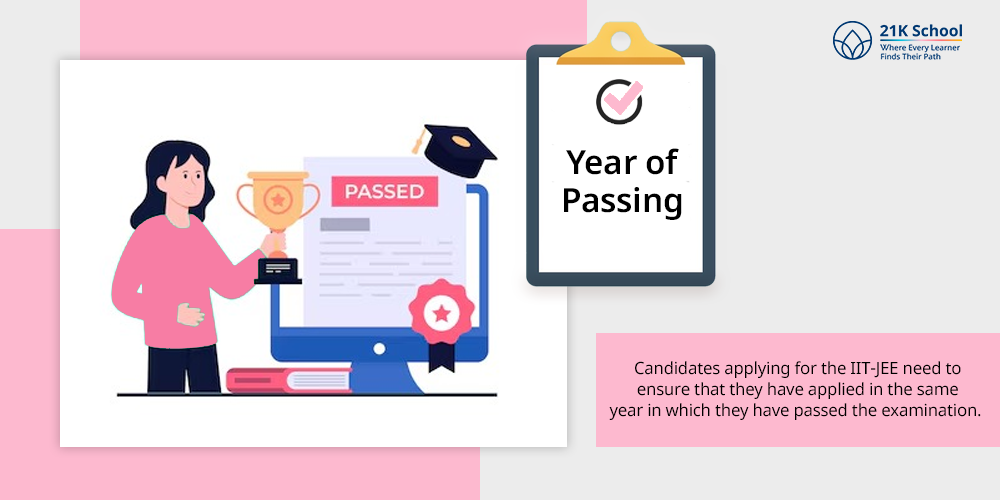
The year of passing is a crucial factor in determining the eligibility criteria for IIT. Candidates applying for the IIT-JEE need to ensure that they have applied in the same year in which they have passed the examination.
For example, candidates who intend to take the JEE Advanced exam in 2026, for instance, must have completed their senior secondary in 2025 or 2026.
This criterion ensures that candidates must be recent graduates, which is necessary to maintain the academic standards of the IITs.
What is the Admission Process for IIT with NIOS?
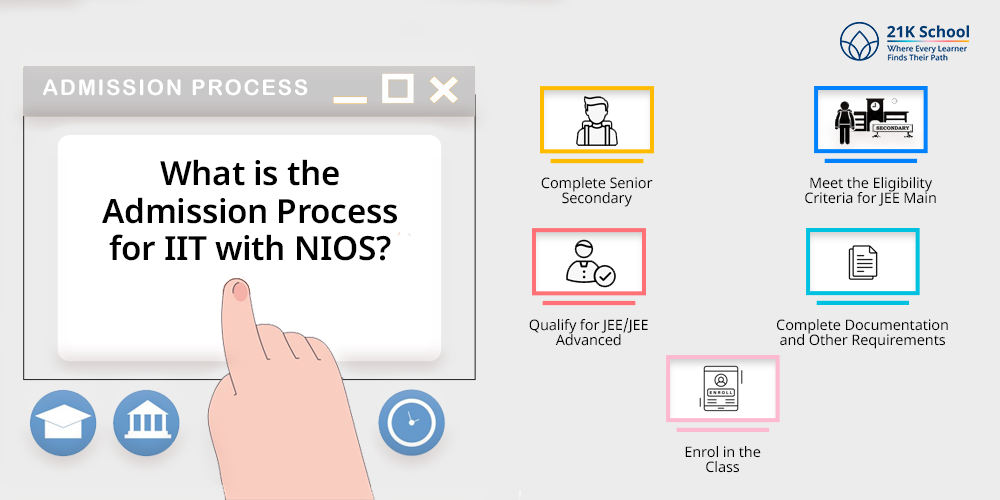
Students can enrol in IIT after passing out their senior secondary examination, along with that, they also need to appear for the JEE examination conducted by IITs.
The admission process for IIT is a structured process which candidates need to follow along with that they have to become eligible for the examination.
Through the NIOS board, students can apply for any competitive examination or higher education examination. Here is the detailed admission procedure for IIT through NIOS board.
1. Complete Senior Secondary
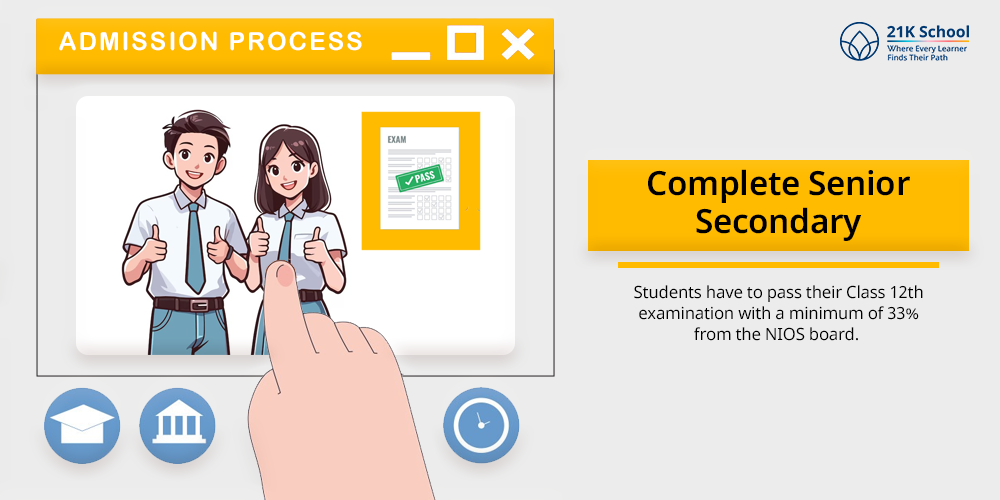
Completing senior secondary examination is the first step of the admission process. Students have to pass their Class 12th examination with a minimum of 33% from the NIOS board.
Candidates appearing for the senior secondary make sure that they have PCM subjects, which are Physics, Chemistry, and Mathematics, as compulsory subjects.
2. Meet the Eligibility Criteria for JEE Main
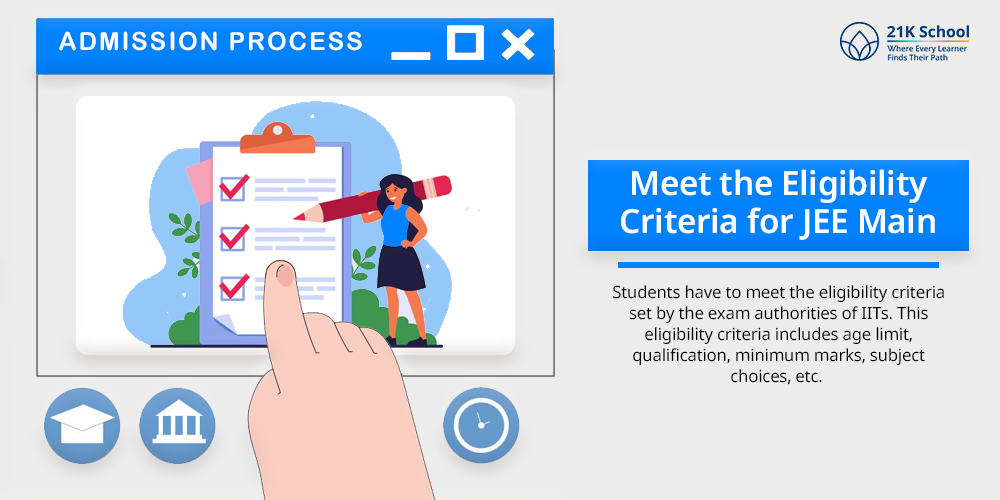
Students have to meet the eligibility criteria set by the exam authorities of IITs. This eligibility criteria includes age limit, qualification, minimum marks, subject choices, etc.
These eligibility criteria are the minimum requirements set by the exam boards in order to assess students capabilities.
As the minimum marks candidates need to secure in order to apply for IIT-JEE is 75% however, relaxation will be provided to SC/ST, OBC, EWS, PwD, etc., reserved category candidates.
3. Qualify for JEE/JEE Advanced
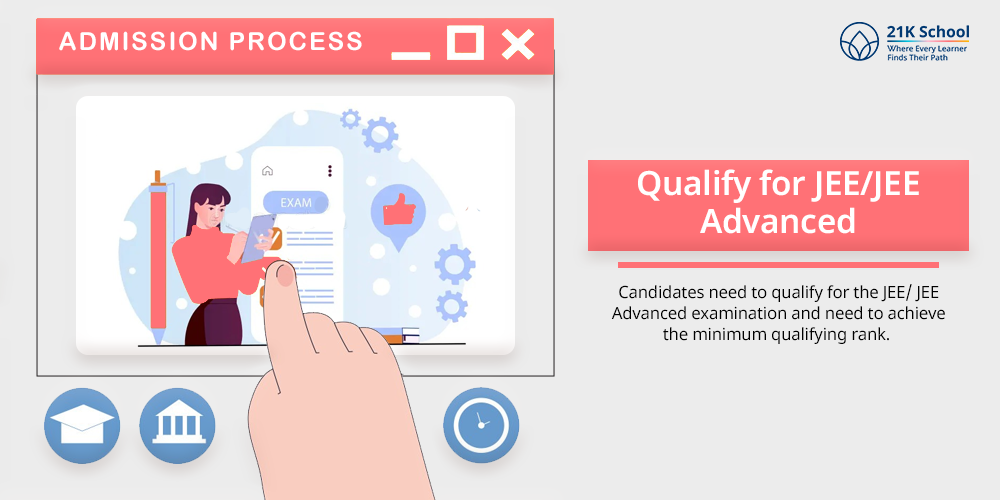
Candidates need to apply for the JEE examination and to register themselves through the NTA programs. Candidates need to qualify for the JEE/ JEE Advanced examination and need to achieve the minimum qualifying rank.
Candidates need to achieve a qualifying rank for JEE and JEE Advanced within 25,000 to 30,000. The Common Rank List (CRL) for the qualification is around 30% or above of the total marks. However, relaxation will be provided to reserved category candidates.
4. Complete Documentation and Other Requirements
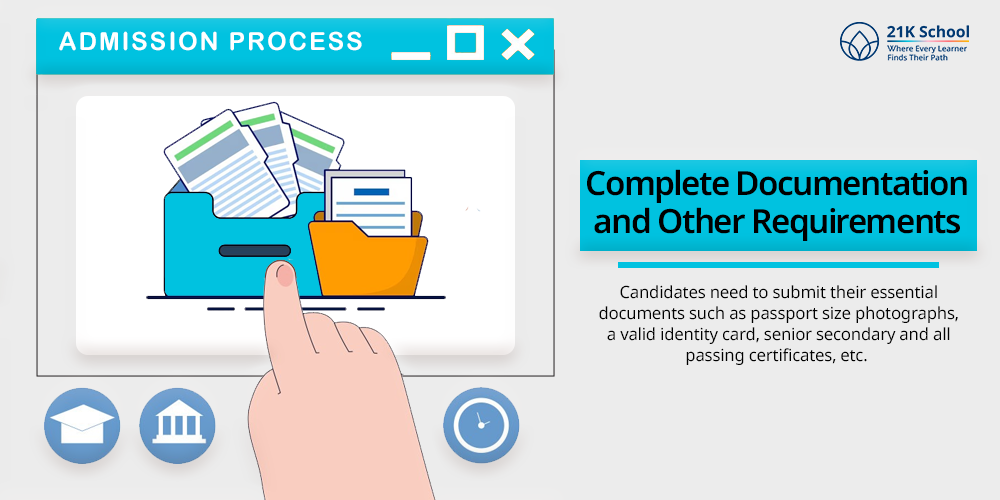
Once the students have qualified for the IIT JEE examination, they have to complete their documentation process. Students have to start by filling out the application form.
Candidates need to submit their essential documents such as passport size photographs, a valid identity card, senior secondary and all passing certificates, etc.
After submitting the documents and application, they need to appear for the counselling round. Students can select any IIT in which they want to enrol, or can apply to multiple ones. The counselling session will be conducted by the Joint Seat Allocation Authority (JoSAA).
5. Enrol in the Class
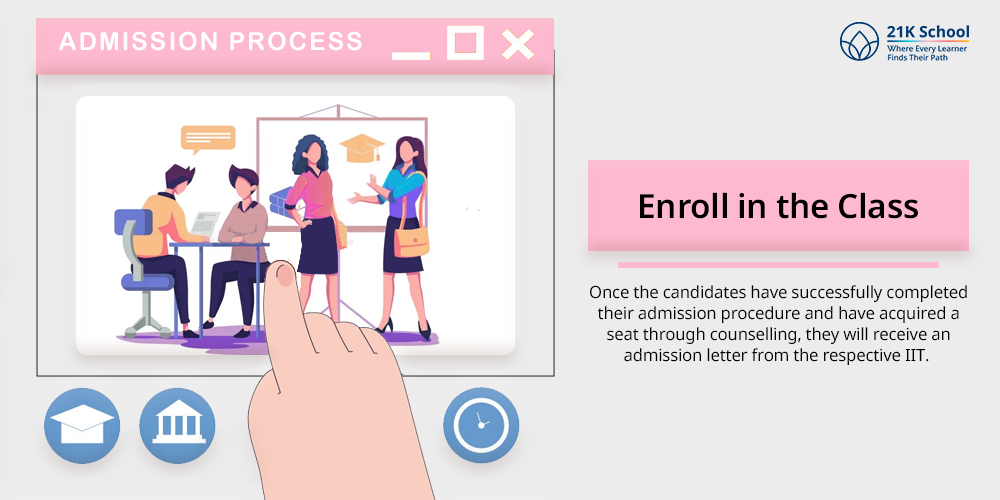
Once the candidates have successfully completed their admission procedure and have acquired a seat through counselling, they will receive an admission letter from the respective IIT.
Now candidates need to pay the Fees and participate in the orientation program. Once the formalities are complete, the students can join the class according to the study schedule .
Tips for NIOS Students Targeting IIT
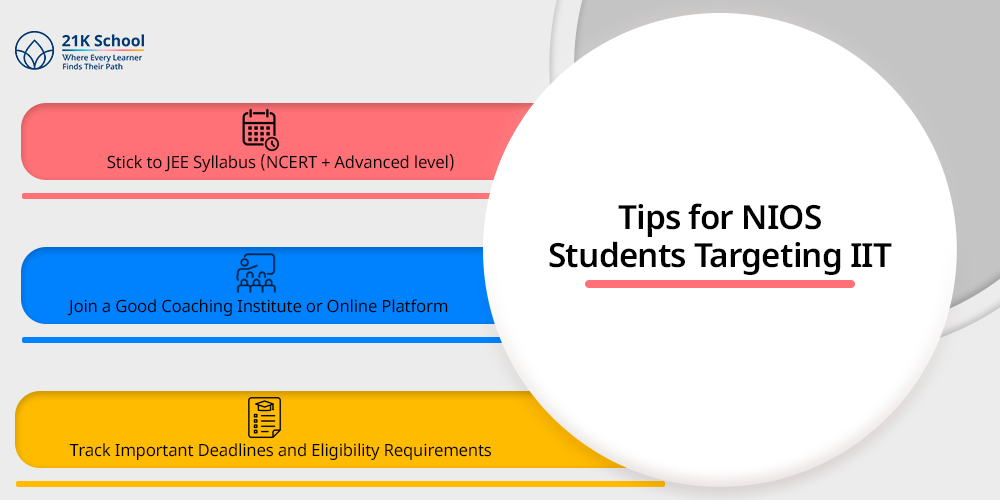
Students who are from NIOS board and targeting for IIT need to follow some rules and regulations.
This is essential for smooth conduction of the examination, which allows students to complete their IIT-JEE exam process without any hassle. Here are the tips a NIOS student can use who are going to appear for the IIT.
1. Stick to JEE Syllabus (NCERT + Advanced level)
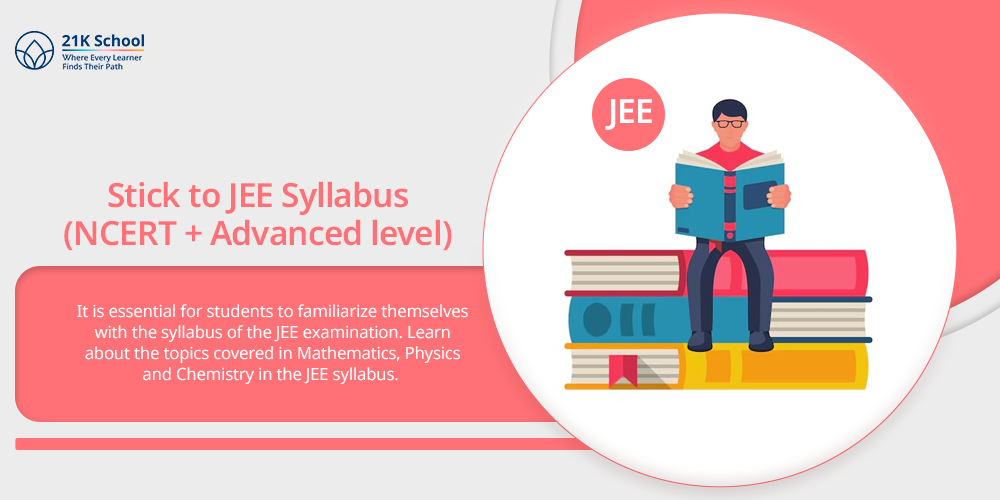
It is essential for students to familiarize themselves with the syllabus of the JEE examination. Learn about the topics covered in Mathematics, Physics and Chemistry in the JEE syllabus.
Prioritize grasping fundamental ideas since they are necessary to tackle challenging issues. Regular practice is essential, which includes resolving a range of problems from advanced and NCERT books.
2. Join a Good Coaching Institute or Online Platform

Select a JEE preparation coaching center or online resource with a successful track record. Look for a well-structured curriculum and knowledgeable instructors.
Personalized attention can be achieved by small batch sizes or one-on-one mentoring. Take part in interactive learning sessions to get discussions and feedback in real time.
3. Track Important Deadlines and Eligibility Requirements
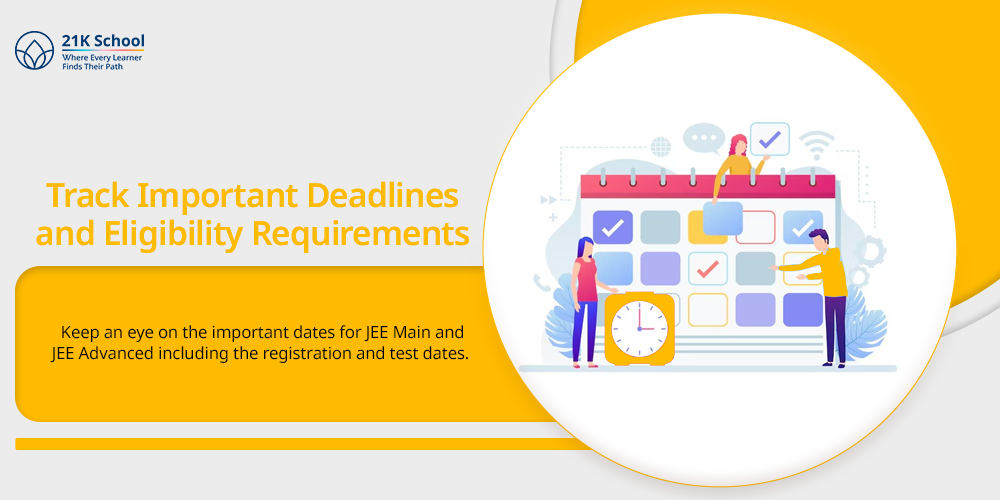
Keep an eye on the important dates for JEE Main and JEE Advanced including the registration and test dates.
Understand the JEE eligibility requirements as well as the age and educational requirements. Learn about the application process, the costs and the necessary documentation.
In Conclusion
The Indian Institutes of Technology (IITs) actually accept applications from National Institute of Open Schooling (NIOS) students who meet the requirements and pass the JEE/JEE Advanced exams.
Being a respectable educational institution, NIOS allows students to complete their coursework and sit for a variety of national examinations, including those for engineering and medicine.
The academic requirements, documentation procedures and age restrictions must be met by NIOS students in order for them to be admitted to IIT.
NIOS students can confidently move forward on their path to an IIT engineering career by adhering to these guidelines.
